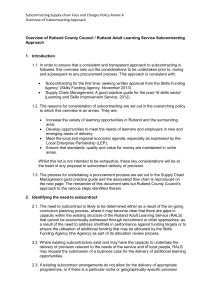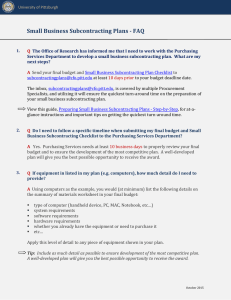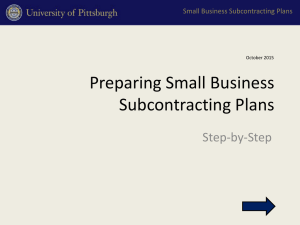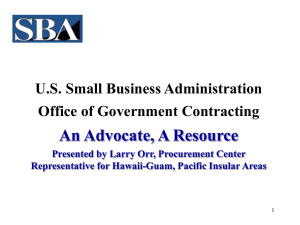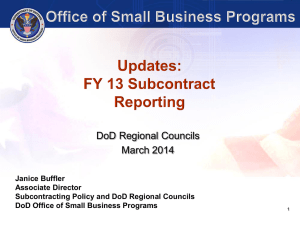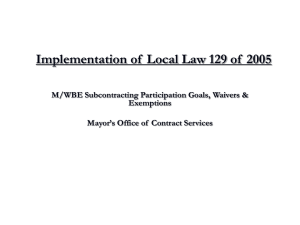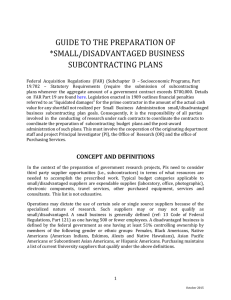Good Faith Effort - DoD Western Regional Council for Small Business
advertisement
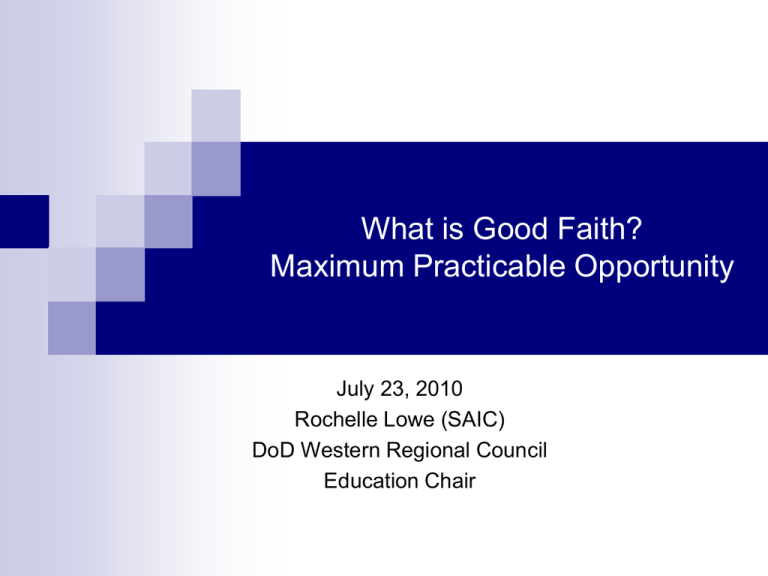
What is Good Faith? Maximum Practicable Opportunity July 23, 2010 Rochelle Lowe (SAIC) DoD Western Regional Council Education Chair OTSB Prime Contractor Responsibilities Maximum practicable subcontracting opportunities provided to small businesses Market research was conducted Small businesses solicited early in the acquisition process Small businesses provided adequate and timely information Good faith negotiations Was additional assistance needed from the SBA? Did the prime direct the SB to the SBA? Bonding, lines of credit, help with insurance, etc. 2 OTSB Prime Contractor Responsibilities Were SB associations utilized Participation in formal Mentor-Protégé programs Submitting subcontracting plans that reflect MPO Make good faith effort to achieve (1) dollars (2) percentage goals and (3) other elements of subcontracting plan Timely reports Cooperate in compliance reviews – including documentation of actual achievement of goals AND good faith efforts for other elements Provide pre-award written notification to unsuccessful SB (over $100k and preference existed) Best practice – provide pre-award written notification under $100k 3 Why is it important? FAR 19.701 “Failure to make a good faith effort to comply with the subcontracting plan” means willful or intentional failure to perform in accordance with the requirements of the subcontracting plan, or willful or intentional action to frustrate the plan. FAR 19.702 (c) As stated in 15 U.S.C. 637(d)(8), any contractor or subcontractor failing to comply in good faith with the requirements of the subcontracting plan is in material breach of its contract. Further, 15 U.S.C. 637(d)(4)(F) directs that a contractor’s failure to make a good faith effort to comply with the requirements of the subcontracting plan shall result in the imposition of liquidated damages. 4 GOOD FAITH Evidence that a large business prime contractor has made a good-faith effort to comply with its subcontracting plan or other subcontracting responsibilities includes supporting documentation that: 5 OTSB performed one or more of the actions described on slides 2 and 3 OTSB fulfilled all the requirements of its subcontracting plan OTSB failed to meet the goals – but over-achieved the goal(s) by an equal or greater amount in one or more of the other categories 13 CFR 125.3 6 Maximum Practicable Subcontracting Opportunities 1. Break out contract work items into economically feasible units 2. Conducting market research to identify small business subcontractors and suppliers through all reasonable means 3. Soliciting SB early in acquisition process 4. Provide adequate bid time 5. Negotiate in good faith with interested SB’s 7 Maximum Practicable Subcontracting Opportunities 6. Send SB’s to the SBA for additional assistance 7. Assist SB’s with bonding, lines of credit, etc. 8. Utilize available services of SB associates, local, state, and Federal SB assistance offices 9. Participate in formal M/P agreements with one or more SB proteges that result in developmental assistance to the proteges 8 What is ITSP In making the determination of Good Faith where to start The Subcontracting Plan . . . willful or intentional failure to perform in accordance with the requirements of the subcontracting plan, or willful or intentional action to frustrate the plan. 9 GOOD FAITH Evidence that a large business prime contractor has made a good-faith effort to comply with its subcontracting plan or other subcontracting responsibilities 13 CFR 125.3 10
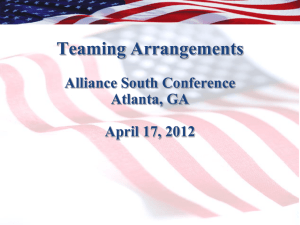
![Small Business Subcontracting Plans [.doc]](http://s3.studylib.net/store/data/009574984_1-d40f565cde03589eb3a4b0ba9416086e-300x300.png)
